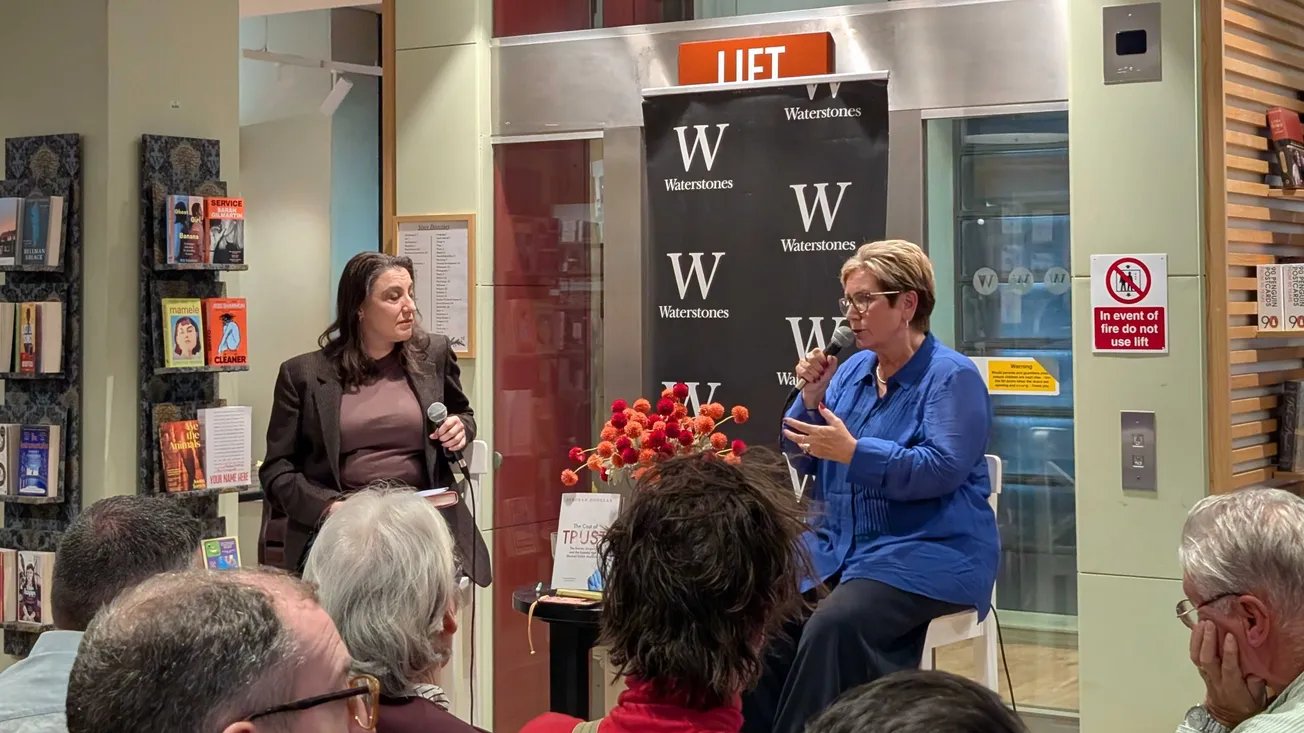Dear Patchers — today marks the 50th anniversary of one of the largest unsolved mass murders in the UK’s recent history. On the 21st of November, 1974, two bombs went off in central Birmingham killing 21 people and injuring 182 others. Over the next 50 years, the city would witness decades of incompetence, miscarriages of justice and the development of competing theories about what really happened that night and afterwards.
After half a century and no convictions, The Dispatch is asking: why hasn’t there been a statutory public inquiry into the bombings, and, most importantly, should there be one? Today Birmingham’s great and good, including Mayor Richard Parker and MPs, will gather on New Street to pay their respects to the dead: but what do they owe the living?
Would an independent public inquiry finally provide a resolution to all those affected by the bombings, including the families of the victims, the wrongly convicted Birmingham Six, and those in the Irish community who suffered discrimination in the aftermath of the attacks?
Marking the importance of the 50th anniversary of the bombings, we’ve decided to make this article free for everyone to read. We are a tiny team working on a shoestring budget so, for free readers who value our in-depth journalism, and who can afford to spend £1.85 a week on a full subscription, please consider clicking the button below to join us. Thanks for your support.

No justice, no peace? Why hasn’t there been a public inquiry into the 1974 Birmingham bombings?
By Samuel McIlhagga & Kate Knowles
This year a decades-long story of incompetence, and elite negligence rocked the British public after a series of articles and an award-winning ITV television series came out. This was the story of the post office scandal: where thousands of subpostmasters were left on the hook and prosecuted over millions of pounds of missing money caused by a faulty IT system installed in 1999. The issue had already secured a statutory public inquiry, three years before the public outcry, in 2021. Another, headline-grabbing, British scandal, that of infected blood in the NHS, goes back to the 1980s and was granted a public inquiry in 2017.
Both of these events are terrible and have had profound impacts on their victims. However, the presence of both high-profile inquiries raises an essential question: why has there been no statutory public inquiry into the 1974 Birmingham pub bombings, one of the largest unsolved mass murders in British history, which occurred 50 years ago today?
Indeed, the lack of an independent public inquiry into Birmingham has become even more surprising now that an inquiry has been launched this year into failings that led to the 1998 Omagh bombing, the largest terrorist attack on Northern Irish soil during The Troubles.
Half a century on, what would it take for Birmingham to secure its own statutory independent public inquiry, and is it even a sensible idea? Today Birmingham’s great and good, including Mayor Richard Parker and MPs, will gather on New Street to pay their respects to the dead: but what do they owe the living?

The story of the Birmingham pub bombings goes like this: on this day, 50 years ago, James Francis Gavin, who was aged about 40, and a younger man planted two bombs in Birmingham city centre: one in the Mulberry Bush at the base of the Rotunda and one in the Tavern on the Town on New Street. They later claimed that civilians were not their targets, rather the Rotunda and the tax office above the Tavern were the only intended casualties that night. They claimed a warning call by their fellow IRA member, Mick Murray, ought to have given the authorities ample time to evacuate the pubs.
That wasn’t to be. Murray struggled to find a working phone box and when he did, gave a bungled message to the Birmingham Post without naming the pubs. The police didn’t think to clear them. Somewhere between 8.17 pm and 8.28 pm — the time is disputed — the first bomb went off in the Mulberry Bush. The second detonated minutes later. A young woman in the Tavern described the lights flickering out and the sound of screaming filling the room. “I flicked on my lighter and saw my friend next to me had lost her foot. I thought I was dead and that my spirit was just carrying on.” In total, 21 people were killed.
Shortly before the explosions, 44-year-old Hughie Callaghan was seeing off a group of five men, a mixture of friends and associates, who were boarding a train to Heysham to catch the ferry to Dublin. They never made the boat. When news reached the police that a group of Irish men had been nearby before the bombs went off, their cards were marked. By the following evening, all six men had been arrested. Members of the West Midlands Serious Crime Squad beat them so savagely, that they secured four false confessions and, after a disastrous trial, they were wrongly imprisoned. They wouldn’t be freed for another 16 years.
Most of the details about what happened that night were uncovered by journalist and former MP Chris Mullin whose investigation was vital to securing justice for the six men. Of the five true perpetrators behind the bombings, three are now dead, while the police officers who were responsible for the original investigation never faced justice.

In 1991, after the Birmingham Six had their convictions quashed in the Court of Appeal, a series of questions, which many had assumed answered, suddenly became issues once again. Who were the IRA bombers, why had civilians been killed after years of the IRA targeting commercial and military targets, why had the West Midlands police failed so spectacularly in identifying the guilty men, and what role, if any, did security negligence, or collusion, play in the bombings? To answer these questions, an epic battle to reopen the coroner’s inquest commenced. In 2016, coroner Sir Peter Thornton reopened an inquest that had been adjourned in 1975, after criminal proceedings were launched against the Birmingham Six. Many of the coroner’s documents from the period between 1974-1975 remain inaccessible under a rule that restricts access to reports for up to 75 years after the event. By the time the papers are released in 25 years, many who remember the bombings first-hand will be dead.
The Chief Coroner of Birmingham, Louise Hunt, had been petitioned in 2015 to reopen the inquests. It was alleged that: one, the West Midlands police had engaged in a cover-up to protect an informant, two, that there had been advance warning of the bombings issued to the state and, three, that the emergency response to the bombings was inadequate. Yet, Hunt allowed an inquest on only one of these concerns: that of the ‘advanced warning’ issue, she dismissed the idea that the emergency services or a police cover-up had any causal connection to the pub deaths. A coroner’s jury, responding to a questionnaire, released after the recent inquests in 2019, ruled that the police had not failed to respond to warning calls, answering ‘NO,’ on the ‘balance of evidence provided,’ when asked if there had been any error on the part of the West Midlands Police in response to the warning call given by the IRA.
Before the new inquests began in the Winter of 2019, there was a prolonged back-and-forth between the families of the bombing victims and the coroner over the scope of the inquest, namely whether it should cover ‘the perpetrator’ issue: identifying those responsible for the deaths. Thornton argued that these were questions for the “police, prosecutors and the criminal courts,” and was successful, with the Royal Courts of Justice determining in 2018 that after years of police “investigations, inquiries and reviews” failing to identify the perpetrator “it would be invidious for the inquests to attempt to do so now.” What the 2019 inquests clearly failed to do, was draw a line under the issue. Family campaigners, such as Julie Hambleton, still consider the inquest a “whitewash,” and after the option of taking the case to the Supreme Court proved prohibitively time-consuming and costly, attention has turned towards the idea of a statutory public inquiry.

In August 2023, evidence about the Birmingham bombings was submitted by the West Midlands Police to the Crown Prosecution Service: but the insufficiency of the information ruled out any convictions being brought against the suspected bombers. Nonetheless, this triggered a reaction from Birmingham politicians. Former West Midlands mayor Andy Street said he believed a public inquiry was “the route to truth, justice, & accountability”, while in 2024 Yardley MP Jess Phillips, put together a letter addressed to the then-Home Secretary requesting an inquiry, signed by almost all Birmingham MPs with two notable exceptions: then-Shadow Justice Secretary Shabana Mahmood and Conservative MP Andrew Mitchell. The latter told The Dispatch he has worked closely with constituents and families who had suffered in this “dreadful terrorist bombing” and he agrees that an inquiry could help them achieve closure. He says he didn’t sign the letter because at the time he was a member of the government. Mahmood was approached for comment by The Dispatch, but as of today, has not responded.
We ask Julie Hambleton, who lost her sister Maxine in the Birmingham bombings, and now leads Justice4the21 — the high profile campaign group led by the families of the victims — why a letter signed by eight Birmingham MPs has, so far, been ignored by the government. “Birmingham MPs haven’t been ignored by the central government, we’ve [the families] been ignored by Birmingham MPs. I’ll tell you who you need to contact,” says Hambleton. “You need to contact [Shabana Mahmood] the Justice Secretary and Birmingham MP, and ask her why she wouldn’t sign a letter in support of us having a public inquiry. Andrew Mitchell would write letters for us, but he also didn’t provide anything of substance.”
Justice4the21 is equally unimpressed by West Midlands Police. According to Hambleton, she wrote to the Chief Constable, Chris Sims, in 2009 asking why there had been no public inquiry and whether he and the West Midlands police force had been investigating the deaths. By Hambleton’s telling, an inspector wrote back to her saying: “he’s too busy for the likes of you, go away.” She then replied telling them how contemptible they both were. She told us that: “They’re both public servants and I demanded to have a meeting with them.” Allegedly, a sergeant wrote back telling her they were on holiday. Over the phone, we asked Julie to provide first-hand evidence of this treatment, but so far The Dispatch has not seen the relevant communication.

According to Hambleton, it took Chris Sims five years to respond to her original letter. She tells us that she finally had a meeting with Sims half a decade after she initially wrote to the chief. Hambleton conveys to us that Sims told her over 35 pieces of primary evidence, relating to the Birmingham bombing case, including an intact third bomb from 1974 had gone missing. She claims Sims was incredibly condescending to the justice campaigners — and that her now solicitor, Barry O’Donnell, who was in the meeting, couldn’t believe “a chief constable could treat the families of the victims of a terrorist attack with such contempt.” Sims has never been knighted, unlike other former West Midlands chief constables, and Hambleton claims this might have been because of the way he allegedly treated the justice campaigners while in office and their conveyance of this behaviour to Home Secretary Theresa May. The Dispatch has approached the West Midlands Police and Chris Sims for comment.
Hambleton also remains suspicious of the British state and its handling of the Birmingham bombing case, telling us that: “if we give up, they win. We are never giving up, we are never going away. Because the [British] state relies on the ‘three Ds,’ deny, delay and death.”
In their fight to raise both funds and awareness for their cause, J421 has built up many associations from a wide range of society. Among the names are some controversial people. In 2014, Frank Portinari, who was convicted of possessing guns and ammunition for the proscribed terrorist organisation the Ulster Defence Association (UDA) in 1994, joined the campaigners in a protest outside Downing Street. He has also been tagged by J421 in social media posts thanking their supporters in the years since.
In 2018, Hambleton spoke at a Birmingham rally held by the Democratic Football Lads Alliance (DFLA), an offshoot of the right-wing group the Football Lads Alliance (FLA) which also held a march on the same day. Although Hambleton put out a statement ahead of the event calling for attendees to remain peaceful, the link with such groups by an anti-extremism campaign is jarring. Indeed, one attendee on the march that day was English Defence League (EDL) founder Tommy Robinson. J421 did not respond to The Dispatch’s questions around this but Hambleton has said of the DFLA that “they came to our aid when very few others wanted to know,” indicating the struggle the campaigners have had to stay afloat over the years. Whether or not these associations have hindered their chances of achieving a Home Office public inquiry is unknown.
One of the key lawyers for the J421 campaign, Christopher Stanley, a litigation consultant at Belfast-based KRW Law tells The Dispatch that he’s pessimistic about the chances of a public inquiry being announced by the Home Office, “All we’ve been told [by the Home Office] after ten years of agitation is that the matter of a public inquiry into Birmingham is, now apparently, ‘live.’ Whatever that means in civil service speak. Do ask a senior civil servant what this means. We’ve been told a decision is pending with the current Home Secretary, well it was pending with the previous Home Secretary.”

The Dispatch approached the Home Office, including current Home Secretary Yvette Cooper, about what the status of a public inquiry being ‘live’ means. A Home Office spokeswoman replied to us, stating: “Our deepest sympathies remain with all those who continue to be affected by the horrific pub bombings in Birmingham in 1974.” The response simply noted that: “On October 22nd, Security Minister Dan Jarvis confirmed to Parliament that he and the Home Secretary will consider requests for a public inquiry as soon as possible.”
The length of time that a request for a public inquiry has been pending with the Home Office is surprising, considering that major West Midlands politicians have been putting pressure on the government for years. The former West Midlands mayor Andy Street remains positive about an inquiry, telling The Dispatch that: “I’m optimistic that any government, be it Conservative or Labour, will come to the right decision: considering all the legal hurdles that have already been passed.” However, a retired Birmingham politician told us off the record that the case for a public inquiry is weak: citing a lack of resources in the Home Office, the length of time since the bombings, the restricted nature of the reopened inquests, the potential protection the Good Friday agreement might provide suspects in Ireland, and the blurring of first-hand memories of the event after 50 years.
Another veteran politician, Lib Dem Paul Tilsley, came within a hair’s breadth of tragedy. He was used to popping into the Tavern for a pint and a chat with his friend, the landlord Dick Lawn. On Thursday 21st November 1974, some business in his ward of Aston had kept Tilsley 20 minutes beyond the time he usually made his way home. Passing the Rotunda, which used to have a clock, he looked up and thought, “hmm, no, I won’t go in tonight.” The bomb went off exactly where he used to stand.
He thinks there is probably more to what happened that night than meets the eye and regards the reluctance of successive governments to call a public inquiry as a protective measure. “There was a huge cock up by the security services and any public inquiry would probably expose that,” he says, with characteristic frankness. However, his appetite for conspiracy ends there. On the question of whether or not the state’s involvement in the attacks runs deeper, he is unconvinced, saying that while “it might be quite a relevant theory in Putin’s Russia, I don’t think that the British government would be that stupid or callous.” Notably, the Home Office has responded to claims of state collusion and, or, a cover-up by saying that they could find “nothing to indicate any attempt by the Government, or state agency, to cover up information about the bombings.”

What Tilsley can speak about with authority is the aftermath of the tragic events, both on the grieving families of the victims and the impact on the Irish community in Birmingham, many of whom lived in Aston at the time. “There was an enormous amount of prejudice,” he says. “People were spitting at [Irish] kids, it was a horrible time.”
Indeed, many questions remain about why Birmingham, among so many major British cities visited by tragedy, has not been given a public inquiry considering the unsolved murders, the death toll and the consequences of the bombing for the Irish community. Carl Chinn, a writer, radio presenter and retired University of Birmingham professor who has authored a book about the Birmingham Irish tells The Dispatch that the lack of an inquiry comes down to adequate political representation.” He argues that nobody of “Andy Burnham’s stature” has come forward to lobby Westminster on behalf of the families: “They [Birmingham politicians] have all come late to the show, to be honest.”
Ultimately, the question of “how, why and who” still hangs in the air in Birmingham. There is no official account of the Birmingham bombings that feels beyond a reasonable doubt for most of the city’s population despite years of litigation and investigative journalism. A public inquiry may, or may not, bring closure for the families of the victims, those wounded by the blast and the six men wrongfully imprisoned for the attack. However, today, on the 50th anniversary of the bombings, a question should be asked of Westminster: why hasn’t Birmingham been given a clear ‘yes’ or ‘no’ answer to the call for a public inquiry?
Chris Sims and Shabana Mahmood have been contacted for comment. As of Thursday 21st of November, 2024, The Birmingham Dispatch has received no reply.








Comments